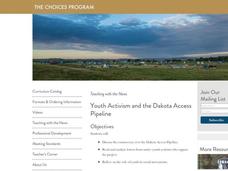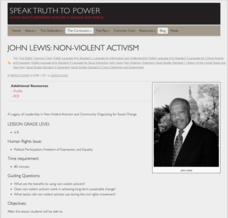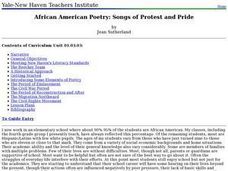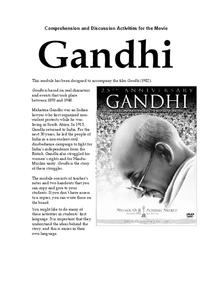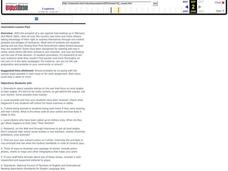PBS
Breaking the Code: Actions and Songs of Protest
Ezell Blair, Jr., David Richmond, Franklin McCain and Joseph McNeil changed history. Their sit-in at the lunch counter of the Woolworths in Greensboro, North Carolina on February 1, 1960 became a model for the nonviolent protests that...
Annenberg Foundation
Poetry of Liberation
How do writers use words to protest injustice, challenge the status quo, and shape their own identities? Individuals watch and discuss a video, read author biographies, write poetry and journals, develop a slideshow, and complete a...
Curated OER
The Art of Social Protest
Students investigate how art and music define and unify a social movement. They decide how art and music can act as symbols of protest. They view both contemporary and historical examples of art as a tool for protest and design an art...
ProCon
National Anthem Protests
San Francisco 49ers quarterback Colin Kaepernick refused to stand for the National Anthem in 2016 as a form of protest. Were his actions appropriate? Using the provided website, pupils attempt to decide for themselves by reading the main...
Curated OER
Rockin’ the World: Rock and Roll and Social Protest in 20th Century America
Students explore protest songs. For this interdisciplinary lesson, students examine issues-based music by summarizing lyrics and revealing inferences, generalizations, conclusions, and points of view found in the songs.
National Constitution Center
Born in the U.S.A: Music as Political Protest
Though often used in shows of patriotism, Bruce Springsteen's 1985 song "Born in the U.S.A." is critical of America's role in the Vietnam war and its treatment of American veterans. High schoolers analyze the song's lyrics in an activity...
Anti-Defamation League
The Hate U Give
The Hate U Give by Angie Thomas became a quick hit in the young adult literature genre before its adaptation in the 2018 film of the same name. Use a thorough lesson, discussion guide, and series of activities to discuss the social...
PBS
Martin Luther King Jr.: Civil Rights Leader
Expand class members' appreciation of the work of Dr. Martin Luther King, Jr. A powerful resource examines King's speeches, writings, and actions that reveal his deep commitment to a nonviolent approach to Civil Rights. Learners watch a...
Curated OER
Gandhi Speech Writing
Explore non-violent protest in this social values and world history lesson. After viewing the movie Gandhi, and discussing important events in Gandhi's life, young orators write a speech defending Gandhi's position on the value of...
Brown University
Youth Activism and the Dakota Access Pipeline
Do young people have a role in social movements? Should they? The involvement of young people in the Dakota Access Pipeline is the focus of a resource that asks class members to examine letters written by native youths who oppose the...
Speak Truth to Power
John Lewis: Non-Violent Activism
After comparing and contrasting non-violent and violent social movements, your young historians will take a closer look at the work and influence of John Lewis on the civil rights movement. They will then choose a current social...
PBS
The Sixties: Dylan Plugs in and Sells Out
Before Woodstock, there was Newport. Get plugged in to the social changes of the 1960s with a lesson plan that looks at Bob Dylan's performance at the 1965 Newport Folk Festival as a symbol of the radical changes that marked the era.
Curated OER
25 Greatest Protest Songs
Students analyze the lyrics of protest songs as a catalyst for social change. They discuss the influence of music on behavior and explain the use of music as historical record.
Curated OER
Gandhi's Voice: Writing as Nonviolent Resistance
Ninth graders identify how Mahatma Gandhi used writing as a means of nonviolent communication. In this nonviolent resistance lesson, 9th graders watch a film about Gandhi as a writer and identify characteristics of nonviolent activism....
Curated OER
Socratic Seminar on Martin Luther King, Jr.’s Letter From Birmingham Jail
Key in the struggle to gain the rights of democratic citizenship was the April 1963 arrest of Dr. Martin Luther King, Jr. for civil disobedience. To deepen their knowledge and understanding of events during the civil rights movement,...
Stanford University
Lesson Plan: The Children's Crusade and the Role of Youth in the African American Freedom Struggle
Young people played significant roles in the Civil Rights movement. Class members examine the contributions of Barbara Johns, Claudette Colvin, Mary Louise Smith, and the children of Birmingham,...
Read Works
Plymouth Colony
Read about the tumultuous beginning to the United States with an informational text passage about Colonial America. As young researchers peruse an article about the arrival of the Mayflower, the settlers' relationship to the neighboring...
Curated OER
African American Poetry: Songs of Protest and Pride
Students are introduced to various time periods in history in which African Americans wrote songs and poetry to cope. In groups, they travel between different stations to listen or read poems and music from the Civil War period, Civil...
Curated OER
Freedom, Power and the People
Students analyze how social change has affected artistic expression and popular culture. the explain the influence of media on contemporary American culture.
Curated OER
Slices of American Pie: The 1960s Through Music
Eleventh graders examine political, cultural, and social movements through music. For this 1960s American history lesson, 11th graders explore the music of the decade in order to better understand the complexity of the time period....
Curated OER
Language Arts, Social Studies, African Americans, The Blues, To Kill A Mockingbird
African American history during the Jim Crow era includes encounters with poverty, racism, disrespect, and protest. Harper Lee develops all four of these themes in her famous 1960 novel, To Kill a Mockingbird. To help students understand...
National Endowment for the Humanities
Revolution '67, Lesson 2: What Happened in July 1967? How Do We Know?
Even in a world in which dozens of participants and curious onlookers record every controversial event, the basic facts of what happened are often in dispute. Revolution '67, Lesson 2 explores 1967 Newark, New Jersey using an examination...
Curriculum Project
Gandhi
Introduce class members to Gandhi's non-violent, non-cooperative ideas with Richard Attenborough's 1982 bio-epic. The film traces the experiences that gave shape to Gandhi's ideas and the actions that eventually lead to the end of...
Curated OER
Speaking Out Against War
Students discuss the affect the Iraq War has had on citizens taking advantage of their right to express themselves through non-violent protests and pledges of resistance. They research and discuss local community and school events and...









